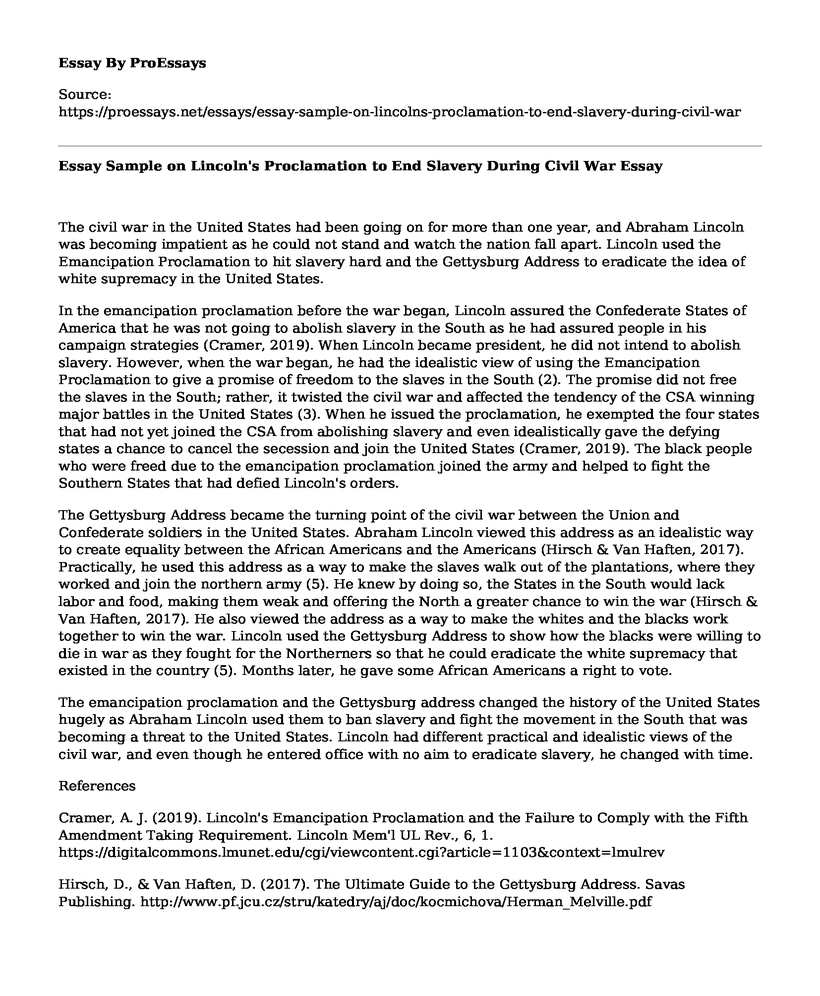The civil war in the United States had been going on for more than one year, and Abraham Lincoln was becoming impatient as he could not stand and watch the nation fall apart. Lincoln used the Emancipation Proclamation to hit slavery hard and the Gettysburg Address to eradicate the idea of white supremacy in the United States.
In the emancipation proclamation before the war began, Lincoln assured the Confederate States of America that he was not going to abolish slavery in the South as he had assured people in his campaign strategies (Cramer, 2019). When Lincoln became president, he did not intend to abolish slavery. However, when the war began, he had the idealistic view of using the Emancipation Proclamation to give a promise of freedom to the slaves in the South (2). The promise did not free the slaves in the South; rather, it twisted the civil war and affected the tendency of the CSA winning major battles in the United States (3). When he issued the proclamation, he exempted the four states that had not yet joined the CSA from abolishing slavery and even idealistically gave the defying states a chance to cancel the secession and join the United States (Cramer, 2019). The black people who were freed due to the emancipation proclamation joined the army and helped to fight the Southern States that had defied Lincoln's orders.
The Gettysburg Address became the turning point of the civil war between the Union and Confederate soldiers in the United States. Abraham Lincoln viewed this address as an idealistic way to create equality between the African Americans and the Americans (Hirsch & Van Haften, 2017). Practically, he used this address as a way to make the slaves walk out of the plantations, where they worked and join the northern army (5). He knew by doing so, the States in the South would lack labor and food, making them weak and offering the North a greater chance to win the war (Hirsch & Van Haften, 2017). He also viewed the address as a way to make the whites and the blacks work together to win the war. Lincoln used the Gettysburg Address to show how the blacks were willing to die in war as they fought for the Northerners so that he could eradicate the white supremacy that existed in the country (5). Months later, he gave some African Americans a right to vote.
The emancipation proclamation and the Gettysburg address changed the history of the United States hugely as Abraham Lincoln used them to ban slavery and fight the movement in the South that was becoming a threat to the United States. Lincoln had different practical and idealistic views of the civil war, and even though he entered office with no aim to eradicate slavery, he changed with time.
References
Cramer, A. J. (2019). Lincoln's Emancipation Proclamation and the Failure to Comply with the Fifth Amendment Taking Requirement. Lincoln Mem'l UL Rev., 6, 1. https://digitalcommons.lmunet.edu/cgi/viewcontent.cgi?article=1103&context=lmulrev
Hirsch, D., & Van Haften, D. (2017). The Ultimate Guide to the Gettysburg Address. Savas Publishing. http://www.pf.jcu.cz/stru/katedry/aj/doc/kocmichova/Herman_Melville.pdf
Cite this page
Essay Sample on Lincoln's Proclamation to End Slavery During Civil War. (2023, May 07). Retrieved from https://proessays.net/essays/essay-sample-on-lincolns-proclamation-to-end-slavery-during-civil-war
If you are the original author of this essay and no longer wish to have it published on the ProEssays website, please click below to request its removal:
- Comparing Slave Colonies in the USA and in Caribbean or Brazil
- Paper Example on Why the US Should Pull Out of the Vietnam War
- History of the Americas Paper Example
- Essay Example on the Second Half of American History: Democracy, Growth, Freedom
- Incidents in the Life of a Slave Girl Book Review
- Essay Example on Rosa Parks: Beyond the Iconic Bus Ride - Exploring Cultural Myths
- Essay Example on Japan's Aggression: War in the Pacific 1930s-WWII







